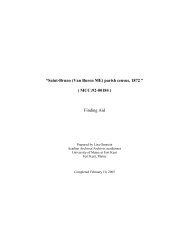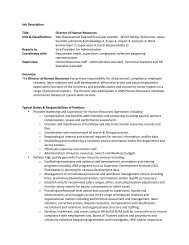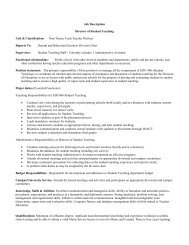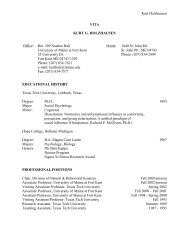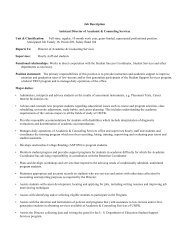summer 2012
summer 2012
summer 2012
- No tags were found...
Create successful ePaper yourself
Turn your PDF publications into a flip-book with our unique Google optimized e-Paper software.
COMMENTARY:QUIDDITCH IN CANADABY ANDREA HILLThis <strong>summer</strong>, dozens of quidditchplayers from around theworld will make their wayto Oxford to represent theircountries in an Olympic quidditchmatch. Sadly, Canadian players willnot be among the mix.It’s not because there aren’t talented,committed quidditch players in Canada—there are, and many teams who’ve had theopportunity to play against Canadian quidditchpowerhouses such as McGill Universitycan attest to this. It’s because the poolof quidditch players within the nation remainslimited. And when the proportion ofplayers able to commit the time and financesto fly across the world to play the sportthey love is small, this poses an impossiblebarrier for the formation of a Canadian nationalteam.Quidditch in Canada has not taken offas it has in the United States. Though thesport arrived in Canada just a couple yearsafter it was first played at Middlebury Collegein Vermont in 2005, it has not gainedthe same nationwide popularity in Canadaas it has farther south. This is evident in thefact that the United States boasts close to120 official member teams whereas Canadahas only eight. America also houses considerablymore unofficial active teams andhigh school teams than its northern neighbour.It is likely not possible for quidditch toever become as widespread in Canada asit is south of the 49th parallel. Part of theproblem is that Canada simply doesn’t havethe same volume of people. Quidditch wasdesigned as, and largely remains, a universitysport. While Canada has close to 150postsecondary institutions, the U.S. Departmentof Education database includesfigures on 6,900 postsecondary educationalinstitutions in the country. The numbersspeak for themselves. Even if quidditchteams are established at half of Canadianpostsecondary institutions, the number ofteams would still pale in comparison towhat is being achieved in the United States.Canada is also short on strong quidditchleaders who could potentially work to promoteand mobilize the sport in the country.The benefits of such a group are best seenin Australia—a nation with a fast-growingquidditch presence despite its isolationfrom the United States. Quidditch in theisland nation of kangaroos and platypusesis overseen by the Australian QuidditchAssociation, a group that works alongsidethe IQA. Its elected members from acrossthe nation share ideas and resources toorganize quidditch events that ultimatelypromote the sport in the country. Thoughthe formation of a similar Canadian QuidditchAssociation has been proposed incasual conversations between players andthrough the country’s quidditch Facebookgroup, no action has yet been taken. Perhapsit’s because communication betweenthe country’s quidditch teams is poor evenin this age of social media and email. Orperhaps it’s because people fail to see thebenefits of such a group in a geographicallylarge country where a team’s closest competitorsmay be in the United States.Quidditch in Canada saw considerablegrowth between 2010 and 2011 whenteams started cropping up across Ontarioand in western British Columbia. However,that growth appears to have slowed andnow captains of some established teams aregraduating, leaving their teams with uncertainfutures.But we don’t need to see the number ofofficial teams climbing for quidditch to be asuccess in Canada. In fact, the nation’s quidditchteams have much to celebrate fromthis season. In October, the first-ever Canadianquidditch tournament was hosted atCarleton University in Ottawa. Seven Canadianteams and a single American teamcompeted in the IQA’s smallest regionaltournament on a chilly October day. Anddespite organizer concerns that the Americanteam would walk away as victor of theCanadian event, the Canuck teams cameout on top with McGill University (Montreal,QC) placing first, Carleton finishingsecond and University of Ottawa takinghome the bronze medal. And less than amonth later, Canada made its largest-evershowing at a Quidditch World Cup withfive teams attending—an increase of oneteam from the year before.That Canada only had five teams at the2011 World Cup may be surprising tomany fans and players who attended thetournament since the singing, chantingand drumming of the Canadian playersoften drowned out American cheers. TheCanadians at the World Cup were damnproud to be there and were proud to berepresenting their country in an Americandominatedsport. Players cheered on otherCanadian teams throughout the weekendand loud choruses of O’Canada could beheard sporadically across Randall’s Island.So will quidditch in Canada ever be asbig as it is in the United States? Probablynot. But that won’t stop players and quidditchfans from getting involved in thegame they love and playing it with incredibleenthusiasm and spirit. nAndrea Hill is the IQA’s international director and captain of the Carleton University quidditch team in Ottawa.LEFT: ANDREA HILL WAVES THE CANADIAN FLAG AT WORLD CUP V.Quidditch Quarterly • Summer <strong>2012</strong> 31



